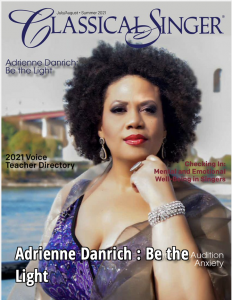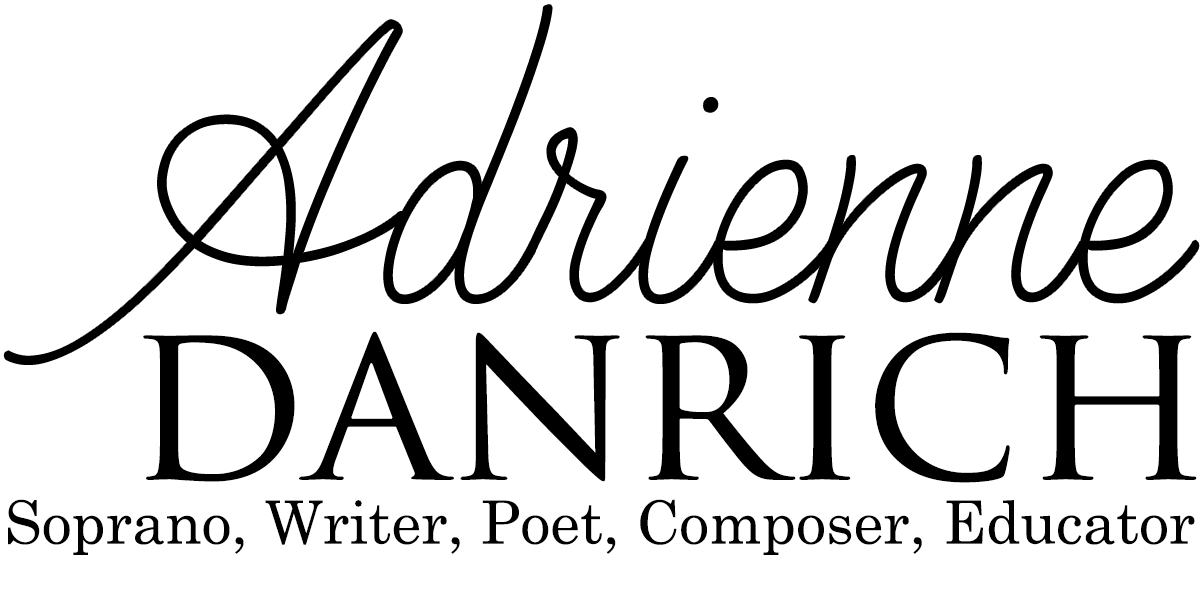On the Cover of this Month’s Classical Singer 
(July-August 2021 Issue)
“Embrace your own special individualism when creating art. Create and be the light.”
Click Here to Read the Article
Interview with Leora Zeitlin of KRWG Las Cruces, NM (Won 1st Place in ‘Radio and Television Interviews’ – New Mexico Press Women April 2017)
Radio interview on NPR with Bonnie North
Television interview on PBS’s Black Nouveau
“Adrienne Danrich: Entrepeneur Diva at UWM” by Third Coast Digest
Soprano Adrienne Danrich, who will appear at UWM Saturday, sings the old-fashioned way, with opera companies around the country: Assorted Mozart roles (Pamina and Countess Almaviva, especially) in San Antonio, Kentucky, Sarasota and more. She’s sung Puccini and Verdi — the High Priestess in Aïda and Anna in Nabucco — in Cincinnati, has involved herself in the development of many new operas, and has been a soloist in countless orchestral programs.
In Milwaukee, though, we know her for a more intimate sort of show. Next Act Theatre introduced her here in 2009, when Next Act’s David Cecsarini added her to Paul Mabon’s show about Paul Robeson. Cecsarini brought her back to Next Act in February of 2010, in This Little Light of Mine, a one-woman show about Marian Anderson and Leontyne Price, African-Americans who made big breakthroughs in opera. Danrich created that show on a commission from the Cincinnati Opera.
Saturday, Danrich will present another solo show she created, An Evening in the Harlem Renaissance. She surveys a cultural flowering of the 1920s and 30s that includes the poetry of Langston Hughes, painters of the Harlem school, and melange of music by composers such diverse composers as William Grant Still, Margaret Bonds, Fats Waller, Eubie Blake and even Harold Arlen, who wrote many songs for the Cotton Club.
In an interview Wednesday, Danrich explained that the original concept was to focus on Hughes exclusively, with all new music by Drew Hemenger. She ran across him and his music by chance. She was in Yellow Springs, Ohio, to do This Little Light. On an off-night, she noticed that the Vogler String Quartet was playing in a near-by church, and she dropped in. It happened to be premiering Hemenger’s piece, and he was there. She loved it, and the Hughes project intrigued him.
The got tentative rights, got to work, and almost finished the piece by July of 2010. That’s when the Hughes estate realized that the permission conflicted with a prior agreement. So Danrich expanded the scope to the whole Harlem Renaissance; Hughes became just one component in it.
“That broadened the show musically, too,” she said. “So I could have the new songs, but also blues, jazz and spirituals. A lot of it is jazzy, but I chose a William Grant Still song that is not jazz-like, to show the range.”
Hemenger’s settings of several Hughes poems remain an important element.
“This is music that was born and bred in America and still affects the consciousness of composers here today,” Danrich said. “The music Drew wrote for this show could have been from this era. It’s just in his soul.”
The UWM Music Department is presenting Danrich on its Yolanda Marculescu Vocal Arts Series. In the days leading up to the Saturday concert, she’s been in a whirlwind of interviews, master-classes and appearances in area schools. She’s fine with all that; Danrich feels an obligation to spread the word of music. Her own background has something to do with that.
Danrich grew up in the west end of St. Louis. When the family home burned down, they moved to the close-in, nearly all-black suburb of Jennings. She was one of four sisters; their disabled mother died in 1999 at the age of 52.
“I feel a real need to reach out to young people, first because music is not being taught in the public schools and second because people of ethnic backgrounds, like me, have not been exposed to opera or the Harlem Renaissance,” she said.
Danrich had the good fortune to live near the arts middle school of the St. Louis Public system. She was Cinderella in the school musical, but it didn’t especially seize her imagination. When the family moved to Jennings, the path of least resistance was the arts high school in the City.
A middle-school music teacher, Aquilla Tinglin, took an interest in Danrich. She tutored her and arranged college auditions, including one that happened the day after the family home burned down.
“She called me and said to borrow some of my cousins’ clothes and do that audition, because ‘the show must go on,’” Danrich said.
She won admission to Howard University that day, but ended up going in another direction. She got voice lessons from Mary Henderson, at Washington University, through an outreach program. Henderson was an Eastman School of Music alum, and sent Danrich in that direction. Today, Danrich holds a bachelor of music education degree from Eastman and a graduate certificate from the Cincinnati Conservatory.
None of this would have happened if opera had not gripped her imagination at first glance.
“In high school, they took us to Powell Hall to hear the symphony and to the Muni to hear musicals,” Danrich said. “I liked it, but I wasn’t really drawn to musicals. Then I saw a video of Kathleen Battle singing Zerbinetta, and I thought she was so adorable. I was crushed when I found out we’re completely different voice types. Then I found Leontyne Price.”
That sealed her fate, but this industrious young woman from the school of hard knocks doesn’t let fate push her around. She’s carving her own very interesting niche in the music business.
“You know, I didn’t know we were poor until I got to college,” she said. “My mother was disabled and were on welfare and food stamps, but I was grateful to have food on the table and coupons to spend for clothes at the Salvation Army store. But I still had a great childhood.
“When I look at pictures from the Harlem Renaissance, I know they had to struggle. But you see those pictures and they’re smiling. The focus is on the good that comes out of the struggle.”
Adrienne Danrich’s own story sounds like the stuff of a one-woman show. And guess what?
“When I was young, before I found opera, I wanted to grow up to be Aretha Franklin,” she said. “I’ve already started writing a show that tells the story of my own journey, from there to Aïda.”

